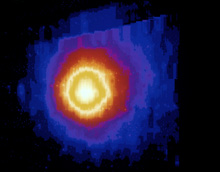My thanks to you folks for giving me a heads up when we have things coming our way.
- LRK -
------------------------------
Bend it Like Beckham! Small Asteroid to Whip Past Earth on June 27, 2011
Don Yeomans & Paul ChodasNASA/JPL Near-Earth Object Program Office
June 23, 2011
Updated: June 26, 2011
Near-Earth asteroid 2011 MD will pass only 12,300 kilometers (7,600 miles) above the Earth's surface on Monday June 27 at about 1:00 PM EDT. The asteroid was discovered by the LINEAR near-Earth object discovery team observing from Socorro, New Mexico. The diagram on the left shows the trajectory of 2011 MD projected onto the Earth's orbital plane over a four-day interval. The diagram on the left gives another view from the general direction of the Sun that indicates that 2011 MD will reach its closest Earth approach point in extreme southern latitudes (in fact over the southern Atlantic Ocean). This small asteroid, only 5-20 meters in diameter, is in a very Earth-like orbit about the Sun, but an orbital analysis indicates there is no chance it will actually strike Earth on Monday. The incoming trajectory leg passes several thousand kilometers outside the geosynchronous ring of satellites and the outgoing leg passes well inside the ring. One would expect an object of this size to come this close to Earth about every 6 years on average. For a brief time, it will be bright enough to be seen even with a modest-sized telescope
snip
------------------------------
"The incoming trajectory leg passes several thousand kilometers outside the geosynchronous ring of satellites and the outgoing leg passes well inside the ring."
Any one's geosync satellite watching the passing?
- LRK -
You may want to look at some other near misses and consider that sky may actually fall in every now and then.
- LRK -
------------------------------
Near Earth Object Program
 Bend it Like Beckham! Small Asteroid to Whip Past Earth on June 27, 2011 Bend it Like Beckham! Small Asteroid to Whip Past Earth on June 27, 2011 June 23, 2011Near-Earth asteroid 2011 MD will pass only 12,000 kilometers (7,500 miles) above the Earth's surface on Monday June 27 at about 1:00 PM EDT. The asteroid was discovered by the LINEAR near-Earth object discovery team observing from Socorro, New Mexico. Full Story |
 Asteroid 2005 YU55 to Approach Earth on November 8, 2011 Asteroid 2005 YU55 to Approach Earth on November 8, 2011 March 10, 2011Near-Earth asteroid 2005 YU55 will pass within 0.85 lunar distances from the Earth on November 8, 2011. The upcoming close approach by this relatively large 400 meter-sized, C-type asteroid presents an excellent opportunity for synergistic ground-based observations including optical, near infrared and radar data. Full Story |
 Asteroid 2011 CQ1 Makes Close Earth Approach on February 4, 2011 Asteroid 2011 CQ1 Makes Close Earth Approach on February 4, 2011 February 4, 2011Asteroid 2011 CQ1 was discovered by the Catalina Sky Survey on February 4 and made a record close Earth approach 14 hours later on February 4 at 19:39 UT (14:39 EST). It passed to within 0.85 Earth radii (5480 km) of the Earth's surface over a region in the mid-Pacific. This object, only about one meter in diameter, is the closest non-impacting object in our asteroid catalog to date. Full Story |
 |
| Asteroid 2010 TD54 to Pass Within Earth-Moon System on October 12, 2010 October 11, 2010A small asteroid will fly past Earth early Tuesday within the Earth-moon system. The asteroid, 2010 TD54, will have its closest approach to Earth's surface at an altitude of about 45,000 kilometers (27,960 miles) at 6:50 EDT a.m. (3:50 a.m. PDT). At that time, the asteroid will be over southeastern Asia in the vicinity of Singapore. During its flyby, Asteroid 2010 TD54 has zero probability of impacting Earth. Full Story |
snip
------------------------------
They don't always miss as you may remember the post from last year.
- LRK -
------------------------------
Doctor's Office Hit By Meteorite in Lorton, Virginia
snip
http://www.myfoxny.com/dpp/Doctor's Office Hit By Meteorite
Updated: Friday, 22 Jan 2010, 2:11 PM EST
Published : Thursday, 21 Jan 2010, 9:39 AM EST
By JOHN HENREHAN/myfoxdc
When Lawrence Reese was cleaning up his sub shop in Lorton, Virginia, late Monday afternoon, he heard a tremendous impact outside.
"Loud. Loud enough [that] you could hear it, maybe, a block or two away," recalls Reese. "I'm surprised it didn't break our glass. That's how loud it was."
Something had come hurtling out of the sky, and crashed through the roof of a nearby doctor's office, landing in an empty examination room.
snip
------------------------------
Any Fourth of July fireworks expected?
- LRK -
Thanks for looking up with me.
- LRK -
Web Site: http://lkellogg.vttoth.
Web Site: http://lkellogg.vttoth.
WordPress: http://lrkellogg.
==============================
Welcome to the American Meteor Society
Founded in 1911 by Dr. Charles P. Olivier
snip
==============================
THE LATEST WORLDWIDE METEOR/METEORITE NEWS
snip
==============================
News and information about the Sun-Earth Environment
QUIET SUN: Solar activity is very low. Only one small sunspot group (AR1241) is crossing the visible face of the sun, and it poses no threat for strong flares.
ASTEROID FLYBY: Asteroid 2011 MD is flying past Earth today, Monday June 27th. At closest approach around 1:00 p.m. EDT the ~10-meter space rock was only 12,000 kilometers (7,500 miles) above the planet's surface. NASA analysts said there was no chance it would strike Earth, and indeed it didn't.
Astronomers around the world are monitoring the object as it flies by. Using a remotely-controled telescope in Cerro Tololo, Chile, Joe Pollock of Appalachian State University obtained this light curve:
"Asteroid 2001 MD appears to be rotating with a 23.3 or 11.6 minute period," notes Pollock.
After closest approach to Earth, the spinning asteroid will recede through the zone of geosynchronous satellites. The chances of a collision with a satellite or manmade space junk are extremely small, albeit not zero. Stay tuned for updates.
After closest approach to Earth, the spinning asteroid will recede through the zone of geosynchronous satellites. The chances of a collision with a satellite or manmade space junk are extremely small, albeit not zero. Stay tuned for updates.
snip
==============================
WHAT THE MIND CAN CONCEIVE AND BELIEVE IT WILL ACHIEVE
==============================





No comments:
Post a Comment
Note: Only a member of this blog may post a comment.